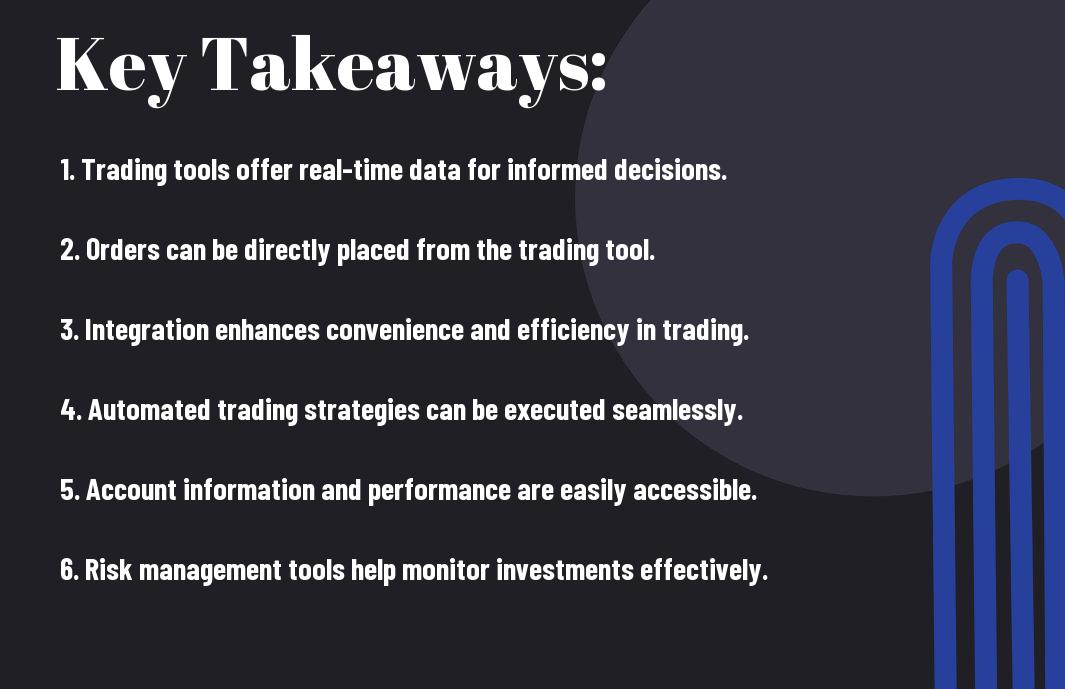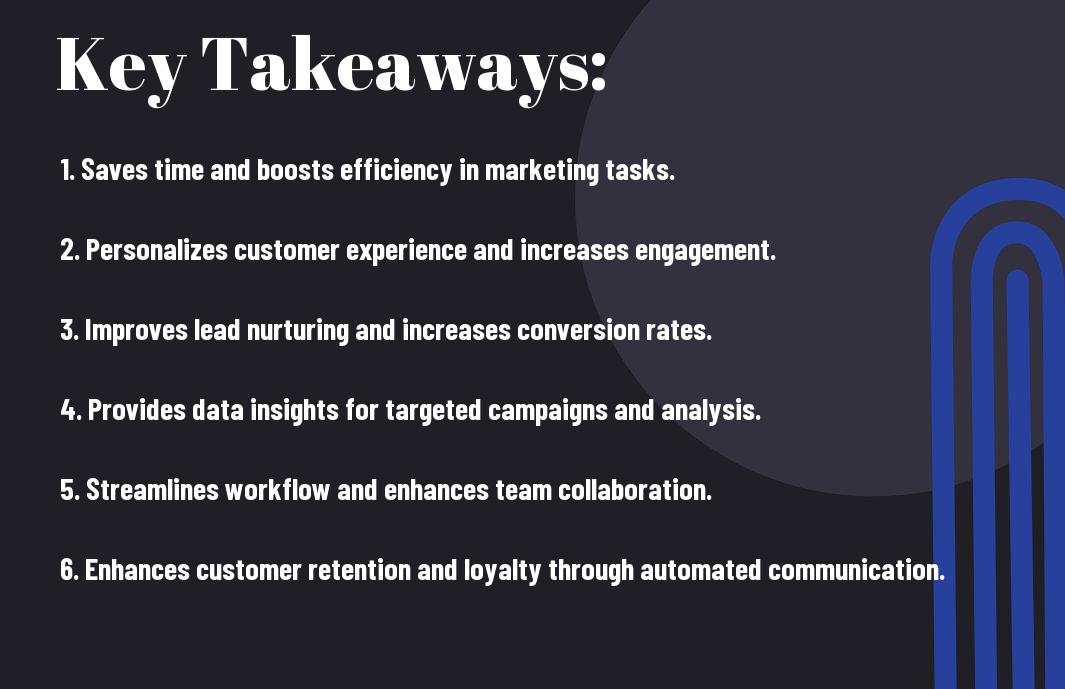Brokerage accounts serve as the gateway to the world of market trading, allowing you to buy and sell securities. Integrating market trading tools with your brokerage account can enhance your trading experience by providing real-time data, analytical tools, and automated trading capabilities. By linking these tools to your account, you can make more informed decisions and execute trades with greater efficiency. Let’s probe into how these integrations work and the benefits they offer for your trading portfolio.
Key Takeaways:
- Efficient Trading: Market trading tools integrated with brokerage accounts allow traders to execute trades quickly and efficiently, maximizing opportunities in the market.
- Real-time Data: These tools provide real-time market data and analytics, empowering traders to make informed decisions and stay ahead of market trends.
- Streamlined Process: Integration of trading tools with brokerage accounts streamlines the trading process by centralizing all trading activities in one platform, enhancing user convenience and experience.

What are Market Trading Tools?
Definition and Types of Trading Tools
As a trader, market trading tools are necessary resources that help you analyze market data, make informed decisions, and execute trades efficiently. These tools come in various forms and cater to different trading styles and strategies. Some common types of market trading tools include:
- Charting platforms
- Technical analysis tools
- Algorithmic trading platforms
- Market scanners
- Trading journals
Any of these tools can be used alone or in combination to enhance your trading performance, depending on your specific goals and preferences.
Importance of Trading Tools in Market Analysis
To effectively analyze the financial markets and make informed decisions, you need access to the right tools. Market trading tools provide you with real-time data, historical price movements, technical indicators, and analytical features that can help you identify trading opportunities and risks. Utilizing these tools can significantly improve your decision-making process and increase your chances of success in the markets.

What are Brokerage Accounts?
One crucial component of market trading tools is the integration with brokerage accounts. Brokerage accounts are specialized financial accounts that allow you to buy and sell various investments, such as stocks, bonds, mutual funds, and exchange-traded funds (ETFs). These accounts are offered by brokerage firms, which act as intermediaries between you and the securities markets.
Definition and Types of Brokerage Accounts
- Types: Traditional, Margin, Retirement, Managed, Online
Any investments you make through a brokerage account are held and managed by the brokerage firm on your behalf. The type of brokerage account you choose will depend on your investment goals, risk tolerance, and trading preferences. Below is a breakdown of the different types of brokerage accounts and their key characteristics in a table:
| Type | Description |
|————-|———————————————————————————————————————-|
| Traditional | Basic brokerage account with no special features or restrictions |
| Margin | Allows you to borrow money from the brokerage firm to buy securities, increasing your buying power |
| Retirement | Specialized accounts, such as IRAs and 401(k) rollovers, designed for retirement savings |
| Managed | Account where investment decisions are made by a professional portfolio manager or robo-advisor |
| Online | Digital platforms that offer self-directed trading, usually with lower fees and no need for a human broker intermediary |
Key Features of Brokerage Accounts
- Buying and selling securities
- Access to market research and data
- Portfolio tracking and management tools
- Customer support and educational resources
- Security measures to protect your account
Thou can choose a brokerage account that aligns with your financial goals and provides the tools and resources you need to make informed investment decisions. It’s crucial to consider factors such as account fees, minimum investment requirements, and available investment options when selecting a brokerage account that suits your needs.
Understanding Key Features of Brokerage Accounts
Brokerage accounts offer a range of features that can help you effectively manage your investments and navigate the complexities of the financial markets. From buying and selling securities to accessing research tools and educational resources, brokerage accounts provide the necessary infrastructure for successful trading.
- Real-time quotes and market data
- Customizable watchlists and alerts
- Trading platforms for different levels of expertise
- Automatic dividend reinvestment
- Tax-efficient trading strategies
Thou can leverage these features to build a diversified investment portfolio, track your performance, and make well-informed decisions based on market trends and analysis.

Integration of Market Trading Tools with Brokerage Accounts
Despite the complexities of the financial markets, integrating market trading tools with your brokerage accounts can make the trading process more seamless and efficient. If you’re new to stock trading, you may wonder how these tools work in conjunction with your brokerage account. To dive deeper into this topic, you can refer to resources like Stock Trading: What It Is and How It Works for a comprehensive overview.
API Integration: How it Works
API integration is a key component that allows market trading tools to communicate with your brokerage account. Application Programming Interfaces (APIs) enable the transfer of data and instructions between different software applications. When you use trading tools that integrate APIs with your brokerage account, you can access real-time market data, execute trades, and manage your portfolio seamlessly.
Benefits of Integrated Trading Tools and Brokerage Accounts
When your market trading tools are integrated with your brokerage account, you gain several advantages. One of the main benefits is the ability to streamline your trading activities. With integrated tools, you can quickly analyze market trends, place trades, and monitor your investments all in one platform. This convenience can help you make faster decisions and react promptly to market changes.
Accounts
Types of Integrations
To effectively use market trading tools, you must understand how they integrate with your brokerage account. There are two main types of integrations: manual and automated. Each type has its own set of advantages and disadvantages. Let’s explore into each to help you choose the right integration for your trading needs.
Manual Integration: Pros and Cons
| Pros | Cons |
| Allows for more control over your trades | Requires more time and effort for manual input |
| Helps you better understand the trading process | Higher potential for human error |
| Can be cost-effective for smaller investors | Not suitable for high-frequency trading |
| May offer more customization options | Limited efficiency and scalability |
| Allows for flexibility in making trading decisions | Could result in missed trading opportunities |
This breakdown should give you a clearer understanding of the benefits and drawbacks of manual integration. Remember to consider your trading style and preferences when deciding on the integration type that suits you best.
Automated Integration: Advantages and Disadvantages
| Pros | Cons |
| Speeds up the execution of trades | Limited control over individual trades |
| Reduces emotional trading decisions | Potential for technical glitches or errors |
| Allows for backtesting of trading strategies | Costlier compared to manual trading |
| Enables round-the-clock trading | Dependency on technology and connectivity |
Plus, using automated integration can streamline your trading process and help you take advantage of market opportunities more efficiently. Keep these advantages and disadvantages in mind as you explore integrating market trading tools with your brokerage account.
Key Features of Integrated Market Trading Tools
For efficient trading, integrated market trading tools offer a range of key features that enhance your trading experience. Some of the prominent features include:
- Real-time data feeds for quick decision-making
- Advanced charting and analytics tools for in-depth market analysis
- Automated trade execution for timely transactions
Assume that you want to explore the best online brokers and stock trading platforms for 2024. You can refer to the 14 Best Online Brokers and Stock Trading Platforms 2024 for more information.
Real-time Data Feeds
Market trading tools equipped with real-time data feeds provide you with up-to-the-minute information on stock prices, market trends, and economic indicators. This feature enables you to make informed decisions quickly, helping you seize profitable opportunities and mitigate risks effectively.
Advanced Charting and Analytics
Data visualization plays a crucial role in understanding market trends and patterns. With advanced charting and analytics tools, you can create complex charts, apply technical indicators, and perform in-depth analysis of securities. This feature empowers you to develop trading strategies based on reliable data and insights.
- Data – Real-time data feeds for quick decision-making
- Analysis – Advanced charting and analytics tools for in-depth market analysis
Plus, trading tools with integrated market features offer:
Automated Trade Execution
The automated trade execution feature allows you to set predefined trading criteria and automatically execute trades based on your strategy. By eliminating manual intervention, this feature helps you capitalize on market opportunities even when you’re not actively monitoring the markets.
The seamless integration of trading tools with brokerage accounts streamlines your trading process, making it more efficient and convenient. With automated trade execution, you can execute your trading plan consistently and take advantage of market movements without delays or missed opportunities.
Benefits of Integrated Market Trading Tools
Enhanced Trading Experience
Unlike traditional trading methods, integrated market trading tools offer you an enhanced trading experience by providing real-time data, advanced charting capabilities, and customizable alerts. These tools allow you to make informed decisions quickly, react to market changes promptly, and execute trades efficiently.
Improved Risk Management
One benefit of integrated market trading tools is the improved risk management they offer. By setting up stop-loss orders, setting profit targets, and utilizing risk management tools, you can protect your investments and minimize potential losses.
On top of that, integrated tools often offer risk assessment features that analyze your trading strategies and provide insights on how to mitigate risks effectively. This proactive approach to risk management can help you navigate volatile market conditions with confidence.
Increased Efficiency
Another advantage of using integrated market trading tools is the increased efficiency they bring to your trading activities. These tools streamline the trading process by providing all the necessary functionalities in one platform, eliminating the need to switch between multiple applications.
Market scanning tools, automated trading algorithms, and portfolio management features help you optimize your trading strategies and make the most of market opportunities. By leveraging these tools, you can execute trades more efficiently and stay ahead of the competition.
Trading
Summing up
With these considerations in mind, you now understand how market trading tools integrate with brokerage accounts. By selecting the right tools that provide seamless integration with your chosen brokerage account, you can access real-time data, analyze market trends, and execute trades efficiently. It’s crucial to ensure compatibility between your trading tools and brokerage platform to maximize your trading experience and achieve your financial goals.
Q: What is the purpose of integrating market trading tools with brokerage accounts?
A: Integrating market trading tools with brokerage accounts allows traders to access real-time market data, execute trades, manage their portfolios, and conduct in-depth analysis all within a single platform. This integration streamlines the trading process, providing convenience and efficiency for investors.
Q: How do market trading tools typically integrate with brokerage accounts?
A: Market trading tools usually integrate with brokerage accounts through APIs (Application Programming Interfaces) provided by the broker. Traders can then connect their trading tools to their brokerage accounts via these APIs, enabling seamless communication and data sharing between the platforms.
Q: What are the benefits of integrating market trading tools with brokerage accounts?
A: Some benefits of integrating market trading tools with brokerage accounts include faster trade execution, access to advanced charting and technical analysis tools, real-time portfolio management, customizable notifications and alerts, and the ability to backtest trading strategies. These integrations provide traders with a comprehensive set of features to make informed investment decisions.




